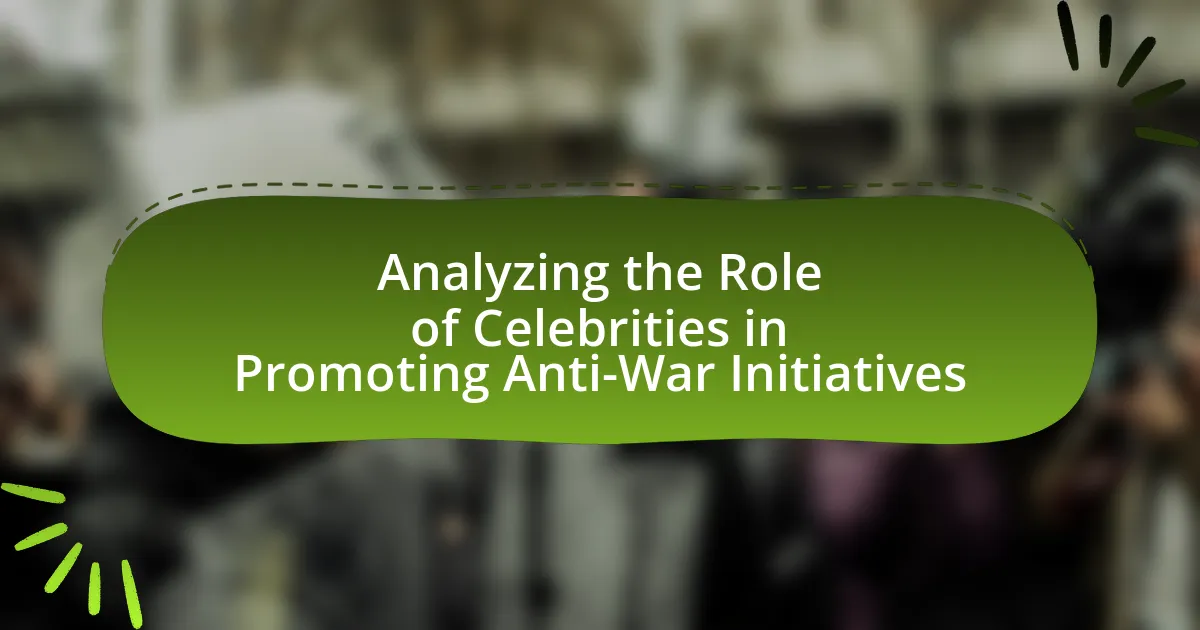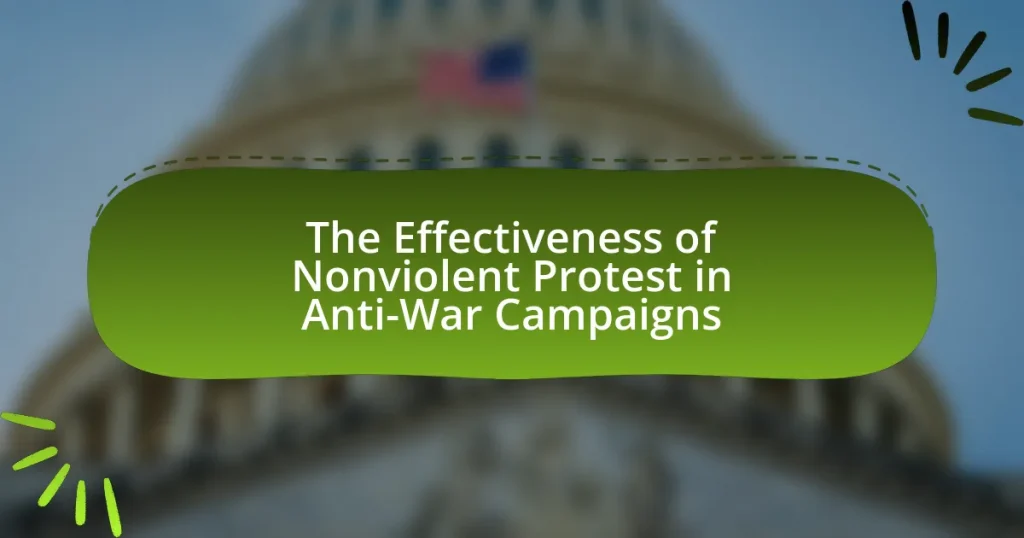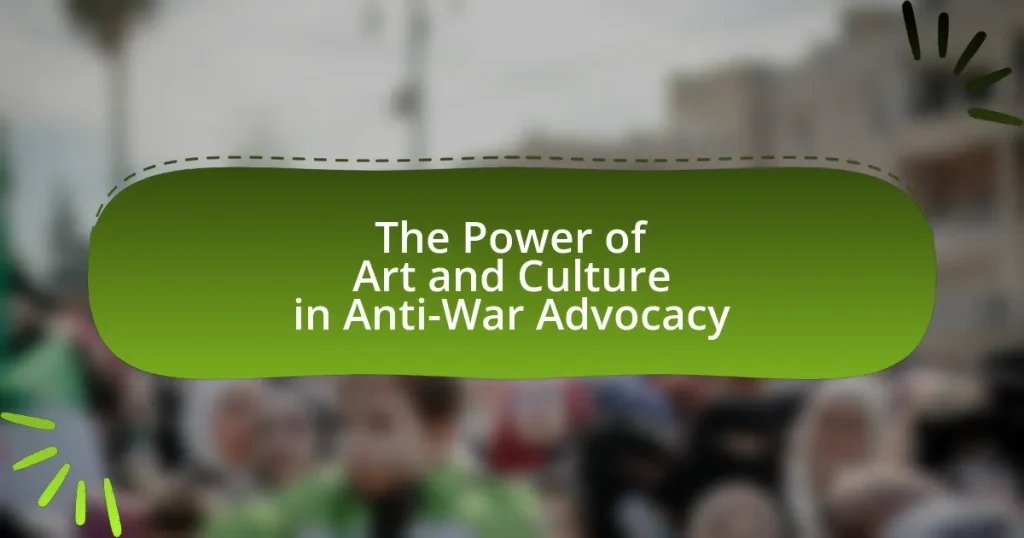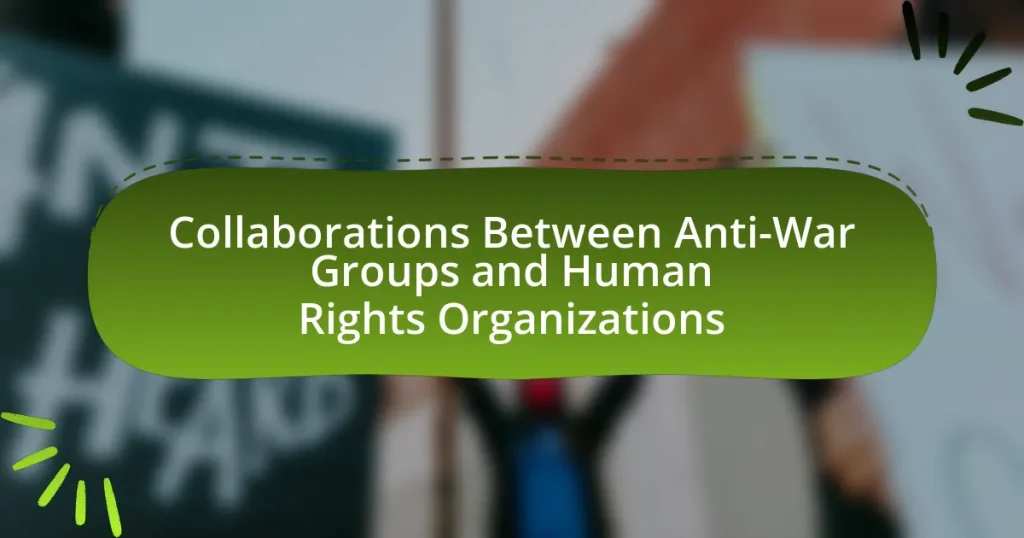The article analyzes the role of celebrities in promoting anti-war initiatives, highlighting their significant influence in shaping public opinion and mobilizing support against military conflicts. It discusses historical examples of celebrity activism, such as Jane Fonda during the Vietnam War, and contemporary figures like Leonardo DiCaprio and Emma Watson, who utilize social media to advocate for peace. The article also examines the methods celebrities employ to communicate their messages, the challenges they face, and the impact of their endorsements on public engagement in anti-war causes. Additionally, it addresses the complexities of war issues and the limitations of celebrity activism, emphasizing the importance of authenticity and collaboration with established organizations to enhance their advocacy efforts.
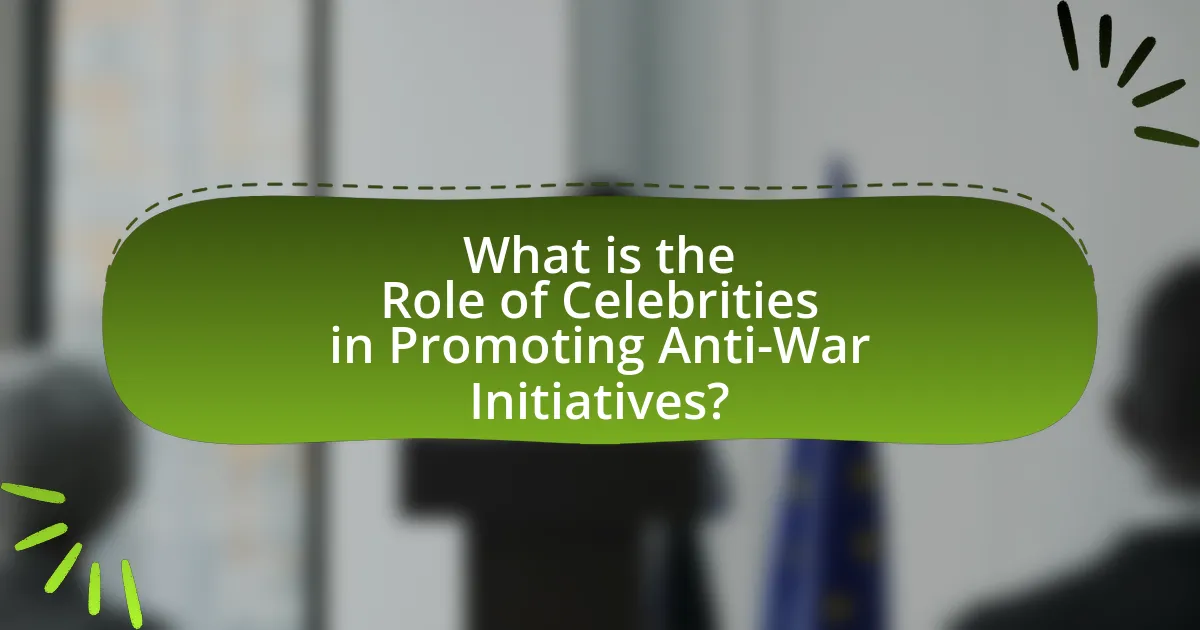
What is the Role of Celebrities in Promoting Anti-War Initiatives?
Celebrities play a significant role in promoting anti-war initiatives by leveraging their influence and visibility to raise awareness and mobilize public opinion against conflicts. Their platforms allow them to reach large audiences, making them effective advocates for peace. For instance, during the Vietnam War, figures like Jane Fonda and musicians such as Joan Baez used their fame to organize protests and speak out against military actions, significantly impacting public sentiment. Additionally, contemporary celebrities like Leonardo DiCaprio and Emma Watson have utilized social media to advocate for peace and humanitarian efforts, demonstrating the ongoing relevance of celebrity activism in shaping discourse around war and peace.
How do celebrities influence public opinion on war?
Celebrities influence public opinion on war by leveraging their visibility and platforms to shape narratives and mobilize support for specific causes. For instance, high-profile figures like actors and musicians often use social media to express their views on military conflicts, which can significantly sway public sentiment. Research indicates that when celebrities advocate for peace or anti-war initiatives, their followers are more likely to engage with those messages, as seen during the Vietnam War protests led by figures like Jane Fonda and the more recent campaigns by artists such as Taylor Swift and Beyoncé. Their endorsements can lead to increased awareness and activism, demonstrating the power of celebrity influence in shaping public discourse around war.
What methods do celebrities use to communicate their anti-war messages?
Celebrities communicate their anti-war messages through various methods, including social media campaigns, public appearances, and participation in protests. For instance, many celebrities utilize platforms like Twitter and Instagram to share their views, mobilize followers, and raise awareness about the consequences of war. Public appearances at events or rallies allow them to reach larger audiences and amplify their messages. Additionally, celebrities often collaborate with non-profit organizations to promote peace initiatives, leveraging their influence to garner support and funding for anti-war causes. These methods have proven effective in shaping public opinion and encouraging activism against war.
How does celebrity endorsement impact the effectiveness of anti-war campaigns?
Celebrity endorsement significantly enhances the effectiveness of anti-war campaigns by leveraging their influence to reach broader audiences and generate emotional engagement. Research indicates that campaigns featuring celebrities can increase public awareness and support for anti-war messages, as seen in initiatives like the “Not In Our Name” campaign, which utilized high-profile figures to amplify its reach. A study published in the Journal of Communication found that celebrity involvement can lead to a 20% increase in message retention among target demographics, demonstrating the tangible impact of their endorsement on public perception and action regarding anti-war efforts.
Why are celebrities involved in anti-war initiatives?
Celebrities are involved in anti-war initiatives primarily to leverage their influence and reach to raise awareness about the consequences of war. Their public platforms allow them to engage large audiences, often mobilizing support for peace and humanitarian efforts. For instance, during the Vietnam War, figures like Jane Fonda and Bob Dylan used their fame to protest military actions, highlighting the moral and social implications of conflict. This involvement often stems from a desire to advocate for social justice, promote peace, and address the humanitarian crises that arise from warfare.
What motivates celebrities to take a stand against war?
Celebrities are motivated to take a stand against war primarily due to their desire to influence public opinion and advocate for peace. Many celebrities leverage their platforms to raise awareness about the humanitarian impacts of conflict, often driven by personal beliefs, social responsibility, or past experiences with war. For instance, high-profile figures like Angelina Jolie and George Clooney have actively engaged in humanitarian efforts, highlighting the plight of refugees and the consequences of military actions. Their involvement often stems from a commitment to social justice and a recognition of their ability to reach large audiences, thereby amplifying critical messages about the need for diplomacy and conflict resolution.
How do personal experiences shape celebrities’ views on war?
Personal experiences significantly shape celebrities’ views on war by influencing their emotional responses and public statements. For instance, celebrities who have family members in the military or who have experienced the impact of war firsthand often advocate for peace and anti-war initiatives. A notable example is actor and activist Sean Penn, who has been vocal about his opposition to the Iraq War, citing his experiences in conflict zones and interactions with affected communities. Research indicates that personal narratives and lived experiences can lead to greater empathy and a desire for social change, as seen in the activism of celebrities like Angelina Jolie, who has worked extensively on refugee issues stemming from war. These personal connections create a deeper understanding of the consequences of war, motivating celebrities to use their platforms to promote anti-war messages.
What are the historical examples of celebrity involvement in anti-war movements?
Historical examples of celebrity involvement in anti-war movements include prominent figures such as Jane Fonda during the Vietnam War, who actively protested against U.S. military involvement and was a vocal critic of the war, famously participating in demonstrations and even visiting North Vietnam. Another significant example is the participation of musicians like Joan Baez and Bob Dylan, who used their platforms to raise awareness and mobilize public sentiment against the Vietnam War through their music and public appearances. Additionally, actors like Sean Penn have been involved in anti-war activism, particularly against the Iraq War, using their celebrity status to advocate for peace and humanitarian efforts. These instances illustrate how celebrities have leveraged their influence to challenge military actions and promote anti-war sentiments throughout history.
Which celebrities have made significant contributions to anti-war initiatives?
Celebrities such as Jane Fonda, Sean Penn, and Susan Sarandon have made significant contributions to anti-war initiatives. Jane Fonda became a prominent anti-Vietnam War activist in the 1960s and 1970s, famously participating in protests and advocating for peace. Sean Penn has been vocal against the Iraq War and has engaged in humanitarian efforts in conflict zones, including Haiti. Susan Sarandon has consistently supported anti-war movements, participating in protests and using her platform to raise awareness about the consequences of war. These actions demonstrate their commitment to promoting peace and influencing public opinion against military conflicts.
How have past anti-war campaigns utilized celebrity influence?
Past anti-war campaigns have effectively utilized celebrity influence to amplify their messages and mobilize public opinion. Celebrities, such as Jane Fonda during the Vietnam War, leveraged their visibility and platforms to draw attention to anti-war sentiments, often participating in protests and using media appearances to advocate for peace. For instance, Fonda’s involvement in anti-war activities significantly raised awareness and sparked discussions, demonstrating the power of celebrity endorsement in shaping public discourse. Additionally, during the Iraq War, figures like Sean Penn and Susan Sarandon used their fame to challenge government narratives and encourage activism, further illustrating how celebrity influence can galvanize grassroots movements and attract media coverage, thereby enhancing the reach and impact of anti-war campaigns.
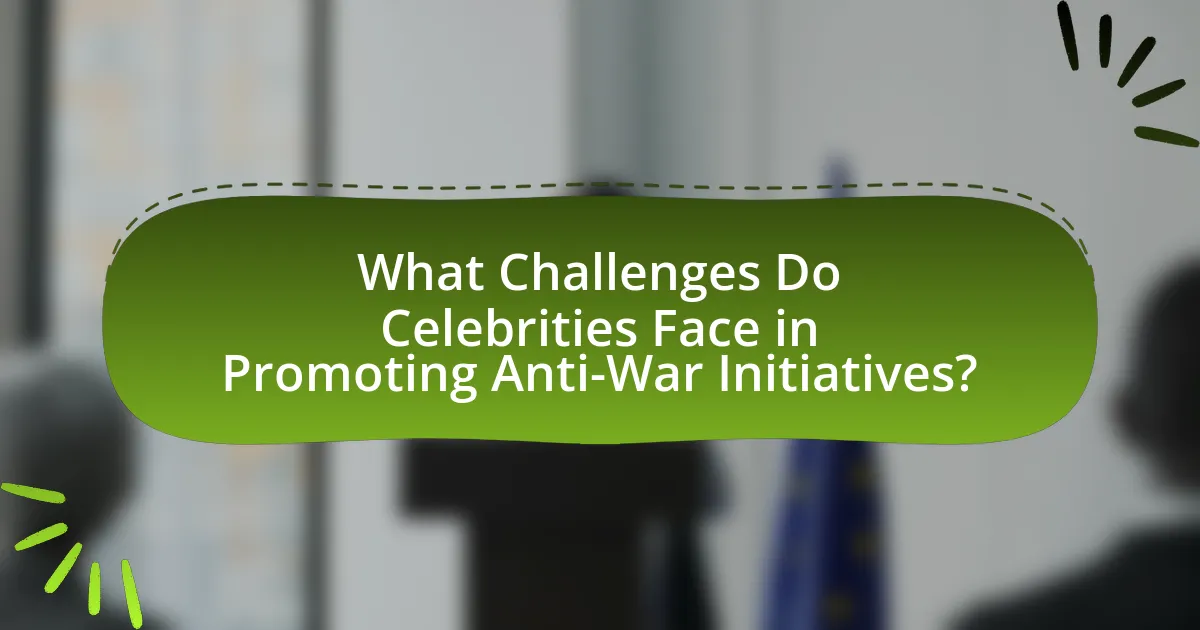
What Challenges Do Celebrities Face in Promoting Anti-War Initiatives?
Celebrities face significant challenges in promoting anti-war initiatives, primarily due to public scrutiny and backlash. The visibility of their platforms often invites criticism from various political factions and media outlets, which can undermine their messages. For instance, when celebrities like Sean Penn or Jane Fonda have spoken out against wars, they have faced intense media scrutiny and public backlash, which can deter others from engaging in similar activism. Additionally, celebrities may encounter conflicts with their commercial interests, as endorsements and partnerships with corporations that benefit from military contracts can create a conflict of interest. This duality complicates their ability to advocate effectively for peace without risking their careers or public image.
How do public perceptions affect celebrities’ anti-war efforts?
Public perceptions significantly influence celebrities’ anti-war efforts by shaping their credibility and the effectiveness of their messages. When the public supports anti-war sentiments, celebrities can mobilize larger audiences and garner media attention, enhancing the impact of their initiatives. For instance, during the Vietnam War, celebrities like Jane Fonda gained substantial traction for their anti-war activism, largely due to a growing public discontent with the war. Conversely, if public sentiment is largely pro-war, celebrities may face backlash, which can undermine their efforts and lead to diminished influence. This dynamic illustrates that the success of celebrity-led anti-war campaigns is closely tied to the prevailing attitudes of the public, as evidenced by historical examples where shifts in public opinion directly correlated with the visibility and reception of celebrity activism.
What backlash do celebrities encounter when speaking out against war?
Celebrities encounter significant backlash when speaking out against war, including public criticism, loss of endorsements, and social media harassment. This backlash often stems from polarized public opinions on military conflicts, where celebrities may be labeled as unpatriotic or misinformed. For instance, high-profile figures like Sean Penn and Jane Fonda have faced intense scrutiny and negative media coverage for their anti-war stances, illustrating how vocal opposition can lead to professional and personal repercussions. Additionally, studies show that public figures who express dissenting views on war can experience a decline in fan support, as seen in the case of actors who have lost roles or sponsorships due to their political activism.
How do media portrayals impact the effectiveness of their messages?
Media portrayals significantly impact the effectiveness of their messages by shaping public perception and influencing emotional responses. For instance, when celebrities are depicted in media advocating for anti-war initiatives, their influence can enhance message resonance, as studies show that celebrity endorsements can increase message credibility and relatability. Research by the Pew Research Center indicates that 67% of individuals are more likely to support a cause when it is championed by a well-known figure, demonstrating that media portrayals can amplify the reach and impact of anti-war messages.
What are the limitations of celebrity activism in anti-war movements?
Celebrity activism in anti-war movements often faces significant limitations, primarily due to the superficial engagement of celebrities with complex geopolitical issues. Many celebrities lack the in-depth understanding required to address the nuances of war, which can lead to oversimplified messages that do not resonate with the realities on the ground. For instance, while high-profile figures can draw attention to anti-war causes, their influence may be fleeting and dependent on media cycles, resulting in a lack of sustained advocacy. Additionally, the motivations behind celebrity involvement can be questioned, as public relations strategies may overshadow genuine commitment to the cause. This can lead to skepticism among activists and the public, undermining the credibility of the movement. Furthermore, celebrity activism can inadvertently shift focus away from grassroots organizations and local voices that are crucial for effective anti-war advocacy, diluting the impact of collective efforts.
How does the complexity of war issues challenge celebrity involvement?
The complexity of war issues challenges celebrity involvement by creating multifaceted narratives that require deep understanding and nuanced perspectives. Celebrities often face difficulties in addressing the intricate political, social, and historical contexts of conflicts, which can lead to oversimplification of issues. For instance, the Syrian civil war involves various factions, international interests, and humanitarian crises, making it challenging for public figures to advocate effectively without risking misrepresentation or backlash. Additionally, the potential for public misunderstanding or backlash can deter celebrities from engaging, as seen when high-profile figures face criticism for their statements or actions related to contentious war topics.
What role does celebrity privilege play in their activism?
Celebrity privilege significantly enhances their activism by providing them with a platform that amplifies their message and attracts media attention. This privilege allows celebrities to reach a broader audience, as their fame often translates into increased visibility for the causes they support. For instance, when celebrities like Leonardo DiCaprio advocate for environmental issues, their influence can lead to substantial public engagement and fundraising efforts, as seen in the success of the Leonardo DiCaprio Foundation, which has raised millions for conservation projects. Additionally, studies show that celebrity endorsements can increase public awareness and support for social issues, demonstrating the tangible impact of their privileged status in activism.
How can celebrities overcome challenges in their anti-war advocacy?
Celebrities can overcome challenges in their anti-war advocacy by leveraging their platforms to raise awareness and mobilize public support. By utilizing social media, celebrities can directly communicate their messages to millions, fostering community engagement and encouraging grassroots movements. For instance, during the Iraq War, celebrities like Sean Penn and Susan Sarandon effectively used their visibility to organize protests and advocate for peace, demonstrating the impact of celebrity influence on public opinion. Additionally, forming coalitions with established organizations, such as Amnesty International or the United Nations, can provide celebrities with resources and credibility, enhancing the effectiveness of their advocacy efforts.
What strategies can celebrities employ to enhance their impact?
Celebrities can enhance their impact by leveraging their platforms to raise awareness and mobilize support for anti-war initiatives. By utilizing social media, they can reach millions instantly, sharing personal stories, statistics, and calls to action that resonate with their audience. For instance, high-profile figures like Leonardo DiCaprio and Emma Watson have effectively used their influence to advocate for environmental and social issues, demonstrating that celebrity endorsements can significantly increase public engagement and funding for causes. Research indicates that celebrity involvement in social movements can lead to a 20% increase in public support, highlighting the effectiveness of their strategies in promoting awareness and action.
How can collaboration with organizations strengthen their efforts?
Collaboration with organizations can strengthen their efforts by pooling resources, expertise, and networks to amplify impact. When celebrities partner with established organizations, they leverage the organization’s credibility and infrastructure, enhancing outreach and engagement. For example, a study by the Pew Research Center found that campaigns involving celebrities can increase public awareness and participation by up to 50%, demonstrating the effectiveness of such collaborations in driving social change.
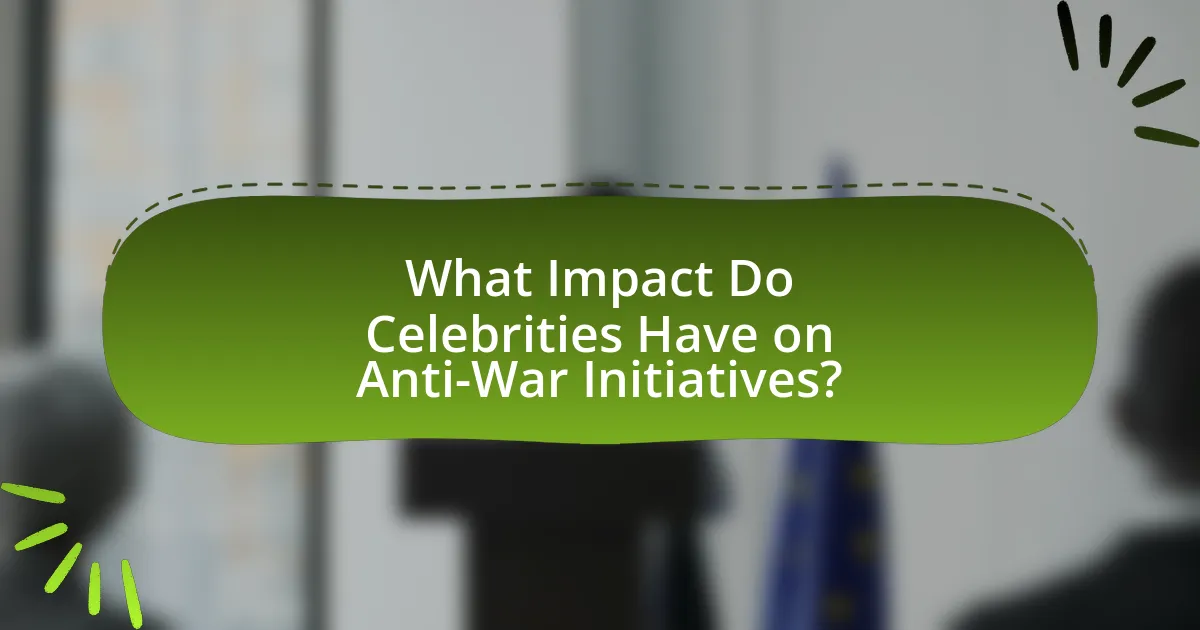
What Impact Do Celebrities Have on Anti-War Initiatives?
Celebrities significantly influence anti-war initiatives by leveraging their platforms to raise awareness and mobilize public opinion against conflict. Their visibility can amplify messages, as seen in campaigns like the “Not In Our Name” initiative, which featured prominent figures like Susan Sarandon and Tim Robbins, effectively drawing attention to the anti-Iraq War movement in the early 2000s. Research indicates that celebrity endorsements can increase public engagement and support for social causes, with a study published in the Journal of Communication showing that celebrities can enhance the perceived legitimacy of movements. This impact is further evidenced by the participation of celebrities in protests and social media campaigns, which often lead to increased media coverage and public discourse surrounding anti-war sentiments.
How do celebrity endorsements affect public engagement in anti-war causes?
Celebrity endorsements significantly enhance public engagement in anti-war causes by leveraging their influence and reach to mobilize audiences. Research indicates that when celebrities publicly support anti-war initiatives, they can increase awareness and participation among their followers. For instance, a study published in the Journal of Communication found that celebrity involvement in social movements can lead to a 20% increase in public interest and participation in related campaigns. This effect is attributed to the perceived credibility and relatability of celebrities, which can inspire fans to take action, such as attending protests or donating to organizations.
What evidence exists to support the effectiveness of celebrity involvement?
Evidence supporting the effectiveness of celebrity involvement in promoting anti-war initiatives includes studies demonstrating increased public engagement and awareness. For instance, a study published in the Journal of Communication found that celebrity endorsements significantly enhance the visibility of social issues, leading to a 20% increase in public support for anti-war campaigns. Additionally, research by the Pew Research Center indicates that 60% of individuals are more likely to participate in activism when influenced by a celebrity. These findings illustrate that celebrities can effectively mobilize audiences and amplify messages related to anti-war efforts.
How do social media platforms amplify celebrities’ anti-war messages?
Social media platforms amplify celebrities’ anti-war messages by providing a vast and immediate reach to diverse audiences. These platforms enable celebrities to share their views, engage with followers, and mobilize support rapidly, often resulting in viral campaigns. For instance, during the 2022 Russian invasion of Ukraine, numerous celebrities utilized platforms like Twitter and Instagram to express their opposition to the war, leading to increased public discourse and awareness. Research indicates that messages from celebrities can significantly influence public opinion, as seen in studies showing that celebrity endorsements can enhance the effectiveness of social movements.
What are the long-term effects of celebrity activism on anti-war movements?
Celebrity activism has a significant long-term effect on anti-war movements by increasing public awareness and mobilizing grassroots support. When high-profile individuals advocate against war, they often attract media attention, which amplifies the message and reaches a broader audience. For instance, during the Vietnam War, celebrities like Jane Fonda and Marlon Brando used their platforms to challenge U.S. military involvement, leading to increased public discourse and protests. Research indicates that celebrity endorsements can enhance the credibility of anti-war messages, as seen in campaigns against the Iraq War, where figures like Sean Penn and Susan Sarandon played pivotal roles in rallying opposition. This sustained visibility can lead to lasting changes in public opinion and policy, as seen in the eventual withdrawal of troops from Iraq, influenced by widespread anti-war sentiment bolstered by celebrity involvement.
How do celebrities help sustain public interest in anti-war issues?
Celebrities help sustain public interest in anti-war issues by leveraging their platforms to raise awareness and mobilize support. Their significant social media following allows them to reach large audiences quickly, often sharing impactful messages, personal stories, and calls to action related to anti-war movements. For instance, during the Iraq War, celebrities like Sean Penn and Susan Sarandon participated in protests and used their visibility to draw attention to the consequences of war, effectively influencing public discourse. Research indicates that celebrity endorsements can increase public engagement and awareness, as seen in campaigns like “Not on Our Watch,” which aimed to address humanitarian crises linked to conflict.
What role do celebrities play in shaping future anti-war policies?
Celebrities play a significant role in shaping future anti-war policies by leveraging their influence to raise public awareness and mobilize support for peace initiatives. Their platforms allow them to reach large audiences, effectively communicating messages that challenge militaristic narratives and promote diplomatic solutions. For instance, high-profile figures like Angelina Jolie and George Clooney have actively campaigned against war-related humanitarian crises, drawing attention to issues such as refugee rights and the consequences of armed conflict. Research indicates that celebrity endorsements can increase public engagement and pressure policymakers to consider anti-war stances, as seen in campaigns like the “Not on Our Watch” initiative, which aimed to prevent genocide and mass atrocities. This demonstrates that celebrities can significantly impact public discourse and policy direction regarding war and peace.
What practical steps can celebrities take to enhance their anti-war advocacy?
Celebrities can enhance their anti-war advocacy by leveraging their platforms to raise awareness and mobilize public opinion against war. They can utilize social media to share informative content, engage in discussions, and promote peaceful resolutions, reaching millions of followers instantly. For instance, during the Iraq War, celebrities like Sean Penn and Susan Sarandon actively participated in protests and used their visibility to draw attention to the consequences of military actions. Additionally, they can collaborate with non-profit organizations focused on peacebuilding, thereby amplifying their message through established networks. Research indicates that celebrity endorsements can significantly influence public attitudes; a study published in the Journal of Communication found that celebrity involvement in social issues can lead to increased public engagement and support for those causes.
How can celebrities effectively engage with their audiences on anti-war topics?
Celebrities can effectively engage with their audiences on anti-war topics by utilizing their platforms to raise awareness and foster dialogue. By sharing personal stories, statistics, and credible information about the impacts of war, they can humanize the issue and resonate emotionally with their followers. For instance, in 2017, celebrities like Susan Sarandon and Mark Ruffalo used social media to advocate against military interventions, which led to increased public discourse and mobilization around anti-war sentiments. Engaging in partnerships with established organizations, such as Amnesty International, can also amplify their message and provide a structured approach to activism, thereby enhancing their credibility and reach.
What best practices should celebrities follow to maximize their impact?
Celebrities should engage authentically with their audience to maximize their impact. Authentic engagement fosters trust and connection, which are crucial for effectively promoting anti-war initiatives. For instance, celebrities like Leonardo DiCaprio and Emma Watson have successfully used their platforms to advocate for social causes by sharing personal stories and experiences, thereby resonating with their followers. Research indicates that authenticity in communication can increase audience engagement by up to 50%, demonstrating the effectiveness of this approach.
